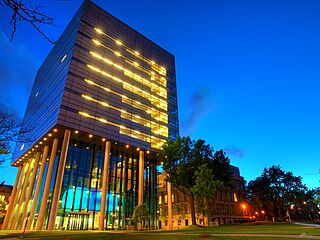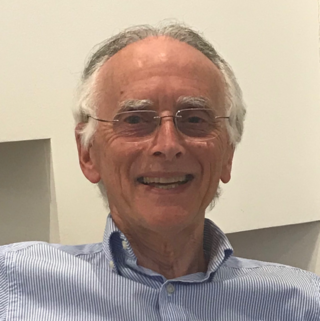Related Research Articles

Pharmacology is a science of medical drug and medication, including a substance's origin, composition, pharmacokinetics, therapeutic use, and toxicology. More specifically, it is the study of the interactions that occur between a living organism and chemicals that affect normal or abnormal biochemical function. If substances have medicinal properties, they are considered pharmaceuticals.

A pharmacist is a healthcare professional who specializes in the preparation, dispensing, and management of medications and who provides pharmaceutical advice and guidance. Pharmacists often serve as primary care providers in the community, and may offer other services such as health screenings and immunizations.

Pharmacy is the science and practice of discovering, producing, preparing, dispensing, reviewing and monitoring medications, aiming to ensure the safe, effective, and affordable use of medicines. It is a miscellaneous science as it links health sciences with pharmaceutical sciences and natural sciences. The professional practice is becoming more clinically oriented as most of the drugs are now manufactured by pharmaceutical industries. Based on the setting, pharmacy practice is either classified as community or institutional pharmacy. Providing direct patient care in the community of institutional pharmacies is considered clinical pharmacy.

A prescription, often abbreviated ℞ or Rx, is a formal communication from a physician or other registered healthcare professional to a pharmacist, authorizing them to dispense a specific prescription drug for a specific patient. Historically, it was a physician's instruction to an apothecary listing the materials to be compounded into a treatment—the symbol ℞ comes from the first word of a medieval prescription, Latin recipere, that gave the list of the materials to be compounded.

The UCL School of Pharmacy is the pharmacy school of University College London (UCL). The School forms part of UCL's Faculty of Life Sciences and is located in London, United Kingdom.
The Royal Pharmaceutical Society of Great Britain (RPSGB) existed from its founding as the Pharmaceutical Society of Great Britain in 1841 until 2010. The word "Royal" was added to its name in 1988. It was the statutory regulatory and professional body for pharmacists and pharmacy technicians in England, Scotland and Wales. In September 2010, the regulatory powers of the Society were transferred to the newly formed General Pharmaceutical Council (GPhC). The RPSGB became the Royal Pharmaceutical Society (RPS) at that time and retained its professional leadership role; the "Great Britain" part of the name was dropped for day-to-day purposes.

Apothecary is an archaic English term for a medical professional who formulates and dispenses materia medica (medicine) to physicians, surgeons and patients. The modern terms 'pharmacist' and 'chemist' have taken over this role.
The Royal Pharmaceutical Society is the body responsible for the leadership and support of the pharmacy profession (pharmacists) within England, Scotland, and Wales. It was created along with the General Pharmaceutical Council (GPhC) in September 2010 when the previous Royal Pharmaceutical Society of Great Britain was split so that representative and regulatory functions of the pharmacy profession could be separated. Membership in the society is not a prerequisite for engaging in practice as a pharmacist within the United Kingdom. Its predecessor the Pharmaceutical Society of Great Britain was founded on 15 April 1841.
The Pharmaceutical Society of Australia (PSA) is a professional organisation of Australian pharmacists. PSA is the peak national body for pharmacists, representing all of the pharmacy profession in Australia, with approximately 18,000 members. PSA is the major provider of continuing professional development programmes for pharmacists in Australia. PSA also organises various pharmacy events including a national conference attended by over 1,200 delegates from around Australia and internationally. PSA publishes the Australian Pharmaceutical Formulary, the Australian Pharmacist journal, and various other pharmacy publications.
A Bachelor of Pharmacy is a graduate academic degree in the field of pharmacy. In many countries, this degree is a prerequisite for registration to practice as a pharmacist. Since both PharmB and PharmD are prerequisites to license in most western countries they're considered equivalent. In many western countries, the foreign graduates with BPharm, PharmB or BS Pharm practice similarly as PharmD graduates. It is analogous to MBBS vs. MD where MBBS is foreign equivalent of MD. It is training to understand the properties and impacts of medicines and developing the skills required to counsel patients about their use.

The Leslie Dan Faculty of Pharmacy is a pharmacy school and an academic division of the University of Toronto. The faculty is located on the northwestern corner of College Street and University Avenue, placing it across from the Ontario Legislative Building and at the entrance to Queen's Park station. It is also situated 1–2 blocks away from four internationally renowned hospitals—The Hospital for Sick Children, Princess Margaret Cancer Centre, Toronto General Hospital and Mount Sinai Hospital. It is part of Toronto's Discovery District.
The pharmaceutical industry in the United Kingdom directly employs around 73,000 people and in 2007 contributed £8.4 billion to the UK's GDP and invested a total of £3.9 billion in research and development. In 2007 exports of pharmaceutical products from the UK totalled £14.6 billion, creating a trade surplus in pharmaceutical products of £4.3 billion.
The General Pharmaceutical Council (GPhC) is the body responsible for the independent regulation of the pharmacy profession within England, Scotland and Wales, responsible for the regulation of pharmacists, pharmacy technicians and pharmacy premises. It was created, along with the Royal Pharmaceutical Society, in September 2010 when the previous body responsible for regulation, the Royal Pharmaceutical Society of Great Britain, was split so that representative and regulatory functions of the pharmacy profession could be separated.

The history of pharmacy as a modern and independent science dates back to the first third of the 19th century. Before then, pharmacy evolved from antiquity as part of medicine. The history of pharmacy coincides well with the history of medicine, but it's important that there is a distinction between the two topics. Pharmaceuticals is one of the most-researched fields in the academic industry, but the history surrounding that particular topic is sparse compared to the impact its made world-wide. Before the advent of pharmacists, there existed apothecaries that worked alongside priests and physicians in regard to patient care.

The history of pharmacy in the United States is the story of a melting pot of new pharmaceutical ideas and innovations drawn from advancements that Europeans shared, Native American medicine and newly discovered medicinal plants in the New World. American pharmacy grew from this fertile mixture, and has impacted U.S. history, and the global course of pharmacy.

The British Society for the History of Medicine (BSHM) is an umbrella organisation of History of medicine societies throughout the United Kingdom, with particular representation to the International Society for the History of Medicine. It has grown from the original four affiliated societies in 1965; the Section for the History of Medicine, The Royal Society of Medicine, London, Osler Club of London, Faculty of the History of Medicine and Pharmacy and the Scottish Society of the History of Medicine, to twenty affiliated societies in 2018.

Nadia Bukhari is a British pharmacist of Pakistani origin living in London, United Kingdom. In 2018, she was awarded the status of Fellow of the Royal Pharmaceutical Society (RPS) making her the youngest female fellow under the Royal Pharmaceutical Society of Great Britain; an honor bestowed to those who have achieved excellence and distinction in their pharmacy career. In addition, she is the first Muslim female and British Pakistani to be a board member of the National Association of Boards of Pharmacy for England, UK. Since 2003, she has been serving in academia at University College London (UCL). She wrote and published many articles on the pharmacy and leadership field at Pharmaceutical Press and BMC Series. In Pakistan, she received the honor to launch the National Alliance for Women in Pharmacy (NAWP) under the Pakistan Pharmacists Association (PPA). She is the global lead at the International Pharmaceutical Federation (FIP) to promote gender equity in the pharmaceutical industry. Also, she has been serving as a trustee and an ambassador for the Pakistan Alliance for Girls Education (PAGE); a charity program supported by the Government of Pakistan. She is also an executive committee member at Indus Health Network UK. In 2021, she launched Equity Pakistan, and is the UK director of the initiative; a gender equity hub for the pharmaceutical workforce in Pakistan; a collaborated initiative taken by Hamdard University Islamabad Campus and University College London (UCL). She was the chief pharmacist at doctHERs; a telemedicine company in Pakistan enabling home-based healthcare females to work in the pharmaceutical industry and connect with low-income patients across Pakistan. Following her departure from doctHERs, Nadia has co-founded ‘Siha Health & Wellness’ and is the Chief Operating Officer. Siha provides one-stop health and wellness solutions for the corporate sector in Pakistan.
Frances ("Fanny") Elizabeth Deacon (1837–1930) was an English chemist and druggist who was the first woman to qualify after the 1868 Pharmacy Act, which made registration with the Pharmaceutical Society of Great Britain (PSGB) compulsory in order to work as a pharmacist.

Malcolm Rowland FBPhS is Emeritus Professor of Pharmacy, University of Manchester, and Adjunct Professor, University of California San Francisco. His research in pharmacology, has been particularly in physiologically based pharmacokinetics. He has written several textbooks on the subject.
The International Society for the History of Pharmacy (ISHP) is a non profit international society devoted to the academic study of the history of pharmacy. The umbrella organization of 29 national societies promotes research, teaching and publication in pharmaceutical history. It regularly organizes congresses and awards a research grant every two years. Publication organs are an annual newsletter and the peer-reviewed journal Pharmaceutical Historian, which is published in cooperation with the British Society for the History of Pharmacy.
References
- ↑ Website British Society for the History of Pharmacy. Retrieved 11 August 2021.
- ↑ Hudson, Briony (2017). "A Golden Year for the British Society for the History of Pharmacy". Pharmacy in History (PDF). 59 (1–2): 47–49. doi:10.26506/pharmhist.59.1-2.0047. S2CID 80192783.
- ↑ Anderson, Stuart (2017). "A New Chapter for Pharmaceutical Historian" (PDF). Pharmaceutical Historian (PDF). 47 (2): 19.
- ↑ Pharmaceutical Historian. International Society for the History of Pharmacy. Retrieved 11 August 2021.
- ↑ Anderson, Stuart; Homan, Peter (2004). "Teaching pharmacy's history. The 2003 survey of UK schools of pharmacy". Pharmaceutical Historian (PDF). 34 (2): 24–26. doi:10.24355/dbbs.084-201802141329. PMID 15307254.